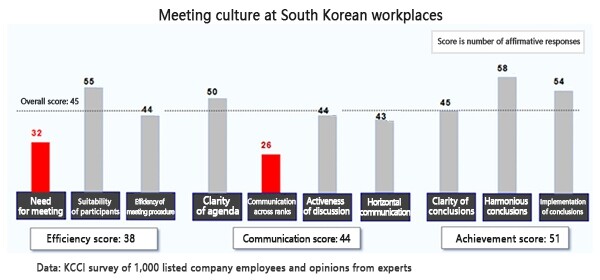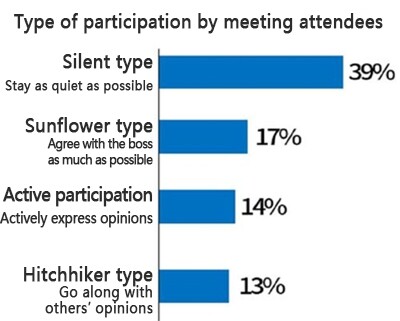hankyoreh
Links to other country sites 다른 나라 사이트 링크
“Unnecessary,” “hierarchical,” “oppressive” - meetings at South Korean companies

Kim, an assistance manager, attends an average of 3.7 meetings a week, each lasting an average of 51 minutes. An average of 1.8 of those meetings are so meaningless as to make him wonder why they are being held at all. Even at necessary meetings, around one-third of the time, or 16 minutes, is usually spent on random or unrelated topics.
The Korea Chamber of Commerce and Industry (KCCI) offered a summary of company culture based on interviews with employees of South Korea’s listed businesses.
On Feb. 26, KCCI published a report titled “Company Culture at South Korean Businesses and Solutions for Improvement,” which included findings from a survey of 1,000 listed company employees and opinions from experts. KCCI concluded that while many South Korean businesses have made steps toward global status in business terms, their company cultures retain pre-modern aspects. As a first step toward improvements, the organization selected the culture surrounding meetings.
For the report, employees were asked what words came to mind when they thought of meetings. Negative descriptions such as “unnecessary,” “hierarchical,” “oppressive,” and “no conclusions reached” accounted for 91% of responses, compared to just 9% for positive responses such as “freedom” and “creative.” When asked to grade meeting culture, working respondents gave it a failing score of 45 points out of 100. Low marks were assigned across all categories, including 38 points for efficiency, 44 for communication, and 51 for results. When asked “Are the meetings ultimately necessary?” and “Is there good communication across ranks at the meetings?” just 31.6% and 26.4% of respondents respectively answered in the affirmative.

Respondents said they had an average of 3.7 meetings a week, with each lasting an average of 51 minutes. Overall efficiency at meetings was also low, with an average of 15.8 minutes, or 31%, spent having idle conversation, checking smartphones, or spacing out. Attendance at meetings was 8.9 people on average, with around one-third of them, or 2.8 people, reported to not actually be needed there.
Meetings were also found to be uniformly centered around the higher-ups, with 61.6% of working respondents responding that the boss “monopolizing speaking” and 75.6% saying decisions were “based on the boss’s opinion.” In addition to the “do what I say” attitude from bosses, invisible employees also appeared to be a factor in the lack of communication. When asked to characterize their meeting attendance, a plurality of respondents (39%) said they tried to “keep as quiet as possible.” In second place were “sunflowers” who agreed with the boss as much as possible (17.1%), followed by “hitchhikers” who followed other people’s opinions without much consideration (12.8%).
Indeed, respondents reported barely speaking for around one-third of the meetings they had attended in the past week. 55.2% of meetings ended without a clear conclusion, while 42.1% resulted in a conclusion, but not an optimal one. As a result, outcomes failed to lead to practice for a reported 46.1% of meetings.
“We’re living in a time that demands creativity and innovation, but there are still many meetings that are about one-sided orders and progress checks, which is an approach that only worked for the industrialization era in the past,” said KCCI executive vice chairperson Lee Dong-geun.
“Companies need to take active steps to create an efficient, creative meeting culture suited to the Fourth Industrial Revolution,” Lee advised.
By Kwack Jung-soo, business correspondent
Please direct questions or comments to [english@hani.co.kr]

Editorial・opinion
![[Guest essay] Amending the Constitution is Yoon’s key to leaving office in public’s good graces [Guest essay] Amending the Constitution is Yoon’s key to leaving office in public’s good graces](https://flexible.img.hani.co.kr/flexible/normal/500/300/imgdb/original/2024/0416/8917132552387962.jpg) [Guest essay] Amending the Constitution is Yoon’s key to leaving office in public’s good graces
[Guest essay] Amending the Constitution is Yoon’s key to leaving office in public’s good graces![[Editorial] 10 years on, lessons of Sewol tragedy must never be forgotten [Editorial] 10 years on, lessons of Sewol tragedy must never be forgotten](https://flexible.img.hani.co.kr/flexible/normal/500/300/imgdb/original/2024/0416/8317132536568958.jpg) [Editorial] 10 years on, lessons of Sewol tragedy must never be forgotten
[Editorial] 10 years on, lessons of Sewol tragedy must never be forgotten- [Column] A death blow to Korea’s prosecutor politics
- [Correspondent’s column] The US and the end of Japanese pacifism
- [Guest essay] How Korea turned its trainee doctors into monsters
- [Guest essay] As someone who helped forge Seoul-Moscow ties, their status today troubles me
- [Editorial] Koreans sent a loud and clear message to Yoon
- [Column] In Korea’s midterm elections, it’s time for accountability
- [Guest essay] At only 26, I’ve seen 4 wars in my home of Gaza
- [Column] Syngman Rhee’s bloody legacy in Jeju
Most viewed articles
- 1[Guest essay] Amending the Constitution is Yoon’s key to leaving office in public’s good graces
- 2Faith in the power of memory: Why these teens carry yellow ribbons for Sewol
- 3[Guest essay] How Korea turned its trainee doctors into monsters
- 4[Editorial] 10 years on, lessons of Sewol tragedy must never be forgotten
- 5Korea ranks among 10 countries going backward on coal power, report shows
- 6Final search of Sewol hull complete, with 5 victims still missing
- 7How Samsung’s promises of cutting-edge tech won US semiconductor grants on par with TSMC
- 8Pres. Park an accomplice in ordering resignation of CJ Group vice chairman
- 9[News analysis] Watershed augmentation of US-Japan alliance to put Korea’s diplomacy to the test
- 10K-pop a major contributor to boom in physical album sales worldwide, says IFPI analyst